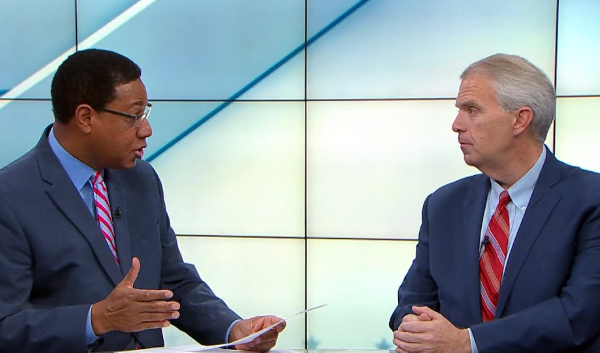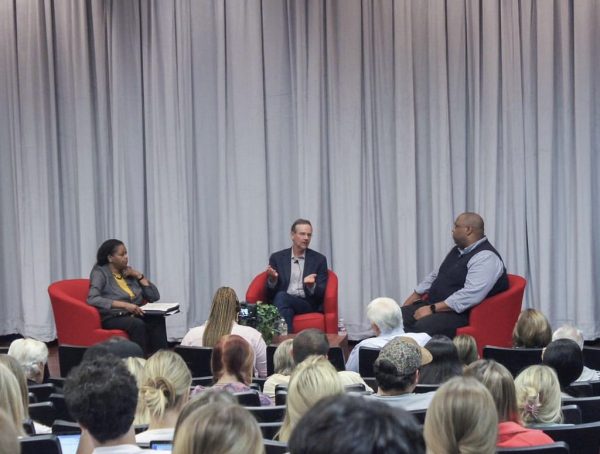NewsLab.org: Powered by the University of Mississippi Meek School of Journalism & New Media
When Tim Kalich joined The Greenwood Commonwealth in April of 1982, it was with the intent of climbing the ladder and getting back to the big city. He left his job as a researcher at Wilson Quarterly, a Washington D.C. based liberal arts journal, when his editor encouraged him to seek a job at a newspaper.
After searching for a job in the glutted Northeast, Kalich turned his attention to the South, not too far from home for the Kansas City native. Kalich drove across the South in a rented car interviewing at six or seven community newspapers until then-editor John Emmerich decided to hire him.
When he arrived at The Commonwealth, his goal was to work his way up and eventually get a job in a larger city, ideally at The Washington Post. Kalich went from journal assignment writer to advertising, where he learned the business side of the newspaper before eventually becoming general manager, then circulation manager. In February of 1995, Kalich took over the reins from Emmerich as editor of The Commonwealth.

Editor of the Greenwood Commonwealth John Kalich spent his entire career at the paper. Photo by Adam Horn.
A firm believer in leading by example, now more than 20 years later, Kalich is still involved in almost every aspect of producing the paper.
“I’m not one of those managers that sits behind a desk and gives orders,” he said. “I’m a hands-on person. No job is beneath me.”
Kalich continues to write and take pictures for The Commonwealth, while being involved with advertising and circulation.
“I try to make certain that I set standards high for myself. so that it’s reasonable for me to set them high for other people,” Kalich explained.
In his eyes, the most important qualities for a reporter are an intellectual curiosity and the ability to ask good questions. The former English major said the best journalists often come from non-journalism academic fields because Kalich feels reporting can be taught to those who possess the key qualities he seeks.
“The best [reporters] have often not necessarily come out of journalism schools,” he said. “They were liberal arts majors who knew how to write and had read a lot.”
Another important quality for his reporters is the ability to take criticism.
“In this business, you receive more criticism than compliments,” he said. “You really need to have a thick skin.”
As editor, Kalich says he listens to others and tries to avoid micromanaging. “Although I probably don’t delegate enough,” he said.
Kalich said he never wants his team to be unsure about what is expected of them, and when it comes to content, Kalich said it’s all about the customer.
“We’re out of business if we don’t please the customers,” he said. “The readers, the advertisers, and then our internal customers – the employees …. It’s all about treating people with respect….If we don’t do that, we won’t be successful in business.”
For small papers, he feels it is important for news to work from local on out, focusing primarily on community and state issues. Kalich says his goal is for the paper to be “the town’s biggest critic and its biggest cheerleader.”
“When we do something really well, I try to use editorial space to salute people,” he said, “and when we do something poorly, I try to use it to say ‘Hey, we didn’t do that right.’”
He aims his editorials at issues involving education, economics and race relations at the community or state level and tries to see issues from both sides.
“If you ask a conservative, they’ll say I’m a Democrat, and if you ask a liberal, they’ll say I’m a Republican,” he said.
That said, he knows it is important to have an opinion and not sit the fence.
“You have to make a call when you write an editorial – who’s right and who’s wrong,” he said. “No one wants to read an editorial that doesn’t have an opinion.”
Kalich advises young career professionals to look for work at a small daily or weekly publication for a couple of reasons. The first is the higher likelihood of being hired by a small paper.
At a community newspaper, he said you will be a part of more facets of the news. “You won’t be just the police reporter,” he said. “You’ll be the police reporter, the education reporter, the politics reporter, the government reporter, the business reporter, the features reporter. You’ll do it all.”
Originally from Itta Bena, Mississippi, Adam Horn has found a second home in Oxford. A junior journalism and political science major, Horn is interested in all things politics and print. He dreams of working as a news reporter for The Washington Post or as a photojournalist for National Geographic. Travel has always been an important career criteria. He has traveled in England, France, Italy and Peru, capturing thousands of high quality photos to document his journeys. Horn also loves live music. He has attended and documented dozens of live concerts, from small local bands to huge festival headliners. He also enjoys long hikes and rock climbing adventures. He has hiked hundreds of miles across at least a dozen trails and climbed dozens of sport climbing routes while taking pictures to document his journeys.








